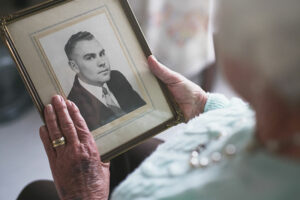July 14, 2022

Broken heart syndrome is a real physical condition that affects people who are grieving the loss of a loved one, but there are ways to help prevent it.
In his documentary about grief, George Shelley uses an analogy of glitter. Toss a handful of glitter into the air, and it is going to settle into all of the crevices and cracks of the room, impossible to fully sweep up and remove. Anyone who has ever lost a loved one can relate. Yet in some instances, grief can be so overwhelming that it can lead to a serious and aptly-named condition: broken heart syndrome.
Broken heart syndrome is a very real physical condition from the intense stress experienced in some forms of grief (such as one spouse losing the other after decades of marriage). The medical term is takotsubo cardiomyopathy, a temporary enlargement of the heart that prevents it from pumping blood effectively.
And, it’s more common than you might know. A number of high-visibility examples include Johnny Cash, who passed away just four months following the loss of his wife and George H.W. Bush, who became ill after the loss of his wife of 73 years.
Researchers have been analyzing the impact of grief on a person’s physical health for decades. In 1995, for instance, the term “widowhood effect” was coined to explain the 30% increase in mortality rate faced by people who lost a longtime partner. Other scientists determined a connection between the immune system and grief. Some surviving spouses simply lose the will to live.
Help prevent this condition and ease the pain of grief for someone you love with these suggestions.
- Help the senior stay involved with comforting, enjoyable activities as much as possible.
- Provide a listening ear and encourage the person to convey their grief in a healthy way.
- Make sure the person is staying hydrated, eating well balanced meals, and getting lots of sleep.
- Emphasize to the senior everything they have to live for, and that living well is the best way to honor the lost loved one’s legacy.
- Talk about the lost loved one, allowing the opportunity for shared memories and stories.
- Recommend the senior speak with a counselor to work through overwhelming emotions.
- Look for a grief support group for the senior to attend, either virtually or in person.
An experienced caregiving companion from Continuum, a provider of home care in Ladue and the surrounding communities, is also a great way to help a loved one who is grieving. We provide socialization and opportunities for reminiscing and conversations, as well as engaging activities, transportation wherever an older adult would like to go, and much more. Call us at (314) 863-9912 or (636) 861-3336 for a free in-home consultation for more information.
